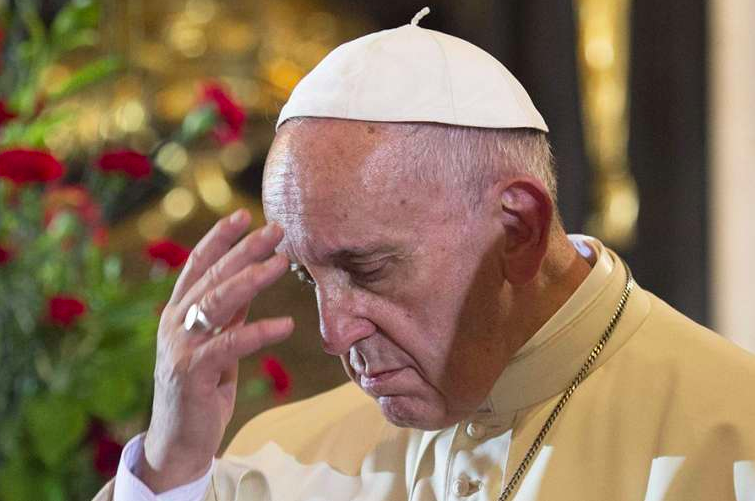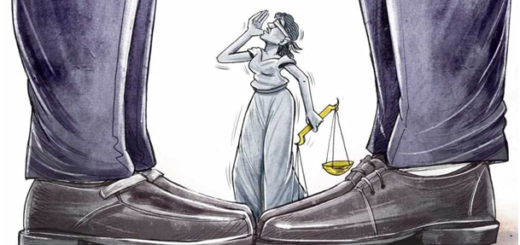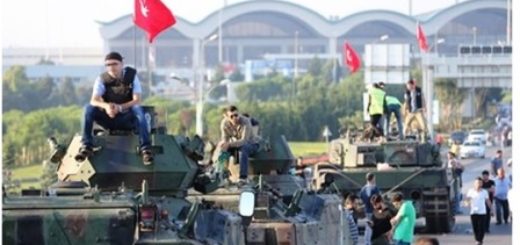Pope Francis, Letter to the Bishops of Chile, signed on April 8, on the “serious mistakes” of negligence and covering up sexual abuse made against a priest in Chile.

 It appears that the sex scandal dogging the Vatican is far from over. Only a few months ago Pope Francis had brushed aside strong allegations of cover-up of sexual abuse against Bishop Juan Barros of Chile. At last, amidst evidences and pressure from various quarters, he admitted his "serious mistakes" in the assessment of the situation. At least the Pope had the courage to encounter Christ and admit his "serious mistakes" unlike most cardinals and archbishops/ bishops the world over, and certainly India where they think they are infallible. The Pope even says "The truth shall set you free" (John 8:32) which is the theme of this year's World Communication Day on Sunday May 13. Dr Robert Moynihan's letter lucidly explains it all. He says "We need a healthy culture of truth-telling in our universities, businesses, dioceses, governments, military units, monasteries and convents and families, and we need it in the Vatican, too, or we will fall, in all of these institutions, into the black holes of lies and coverups." Isaac Gomes, Asso. Editor, Church Citizens' Voice.
It appears that the sex scandal dogging the Vatican is far from over. Only a few months ago Pope Francis had brushed aside strong allegations of cover-up of sexual abuse against Bishop Juan Barros of Chile. At last, amidst evidences and pressure from various quarters, he admitted his "serious mistakes" in the assessment of the situation. At least the Pope had the courage to encounter Christ and admit his "serious mistakes" unlike most cardinals and archbishops/ bishops the world over, and certainly India where they think they are infallible. The Pope even says "The truth shall set you free" (John 8:32) which is the theme of this year's World Communication Day on Sunday May 13. Dr Robert Moynihan's letter lucidly explains it all. He says "We need a healthy culture of truth-telling in our universities, businesses, dioceses, governments, military units, monasteries and convents and families, and we need it in the Vatican, too, or we will fall, in all of these institutions, into the black holes of lies and coverups." Isaac Gomes, Asso. Editor, Church Citizens' Voice.
 "As for my own responsibility, I acknowledge… that I have made serious mistakes in the assessment and perception of the situation, especially because of the lack of truthful and balanced information."—Pope Francis, Letter to the Bishops of Chile, signed on April 8, Divine Mercy Sunday, but released in Rome and Chile yesterday, April 11. The "serious mistakes" the Pope mentions have to do with accusations of negligence and covering up sexual abuse made against a priest in Chile. The Pope was persuaded that the accusations, made against Father Juan Barros, were untrue, and in 2015, despite criticism, made Barros a bishop. However, following an investigation carried out in February by Archbishop Charles Scicluna, the Pope has come to believe the accusations of negligence were in fact valid. Hence this letter
"As for my own responsibility, I acknowledge… that I have made serious mistakes in the assessment and perception of the situation, especially because of the lack of truthful and balanced information."—Pope Francis, Letter to the Bishops of Chile, signed on April 8, Divine Mercy Sunday, but released in Rome and Chile yesterday, April 11. The "serious mistakes" the Pope mentions have to do with accusations of negligence and covering up sexual abuse made against a priest in Chile. The Pope was persuaded that the accusations, made against Father Juan Barros, were untrue, and in 2015, despite criticism, made Barros a bishop. However, following an investigation carried out in February by Archbishop Charles Scicluna, the Pope has come to believe the accusations of negligence were in fact valid. Hence this letter
"When they delivered to me the report… they acknowledged before me having felt overwhelmed with the pain of so many victims of grave abuses of conscience and power and, in particular, of the acts of sexual abuse committed by various consecrated men of your country against minors." —Ibid.
==================
A Need for Truth
Yesterday, the Vatican made public a remarkable letter Pope Francis has written to the bishops of Chile.
In the letter, Francis admits making "serious mistakes" in handling Chile's scandalous sexual abuse crisis, and asked for forgiveness.
Below is the actual text of the Pope's letter, and a useful Catholic News Agency (CNA) article by Elise Harris, which lays out the background of this case.
But what is striking about all of this is the light it sheds on a pathology of decision-making which can lead to poor, or certainly less than optimal, decisions in governments from Washington D.C. to Moscow to Beijing to Berlin to Brussels, and everywhere in between — and not least, in Vatican City itself — due to lack of truth-telling.
=====================
We, all of us, need truth as we need light and air. And equally, to avoid lies, as we would avoid the "Father of Lies," the devil — about whom Pope Francis speaks at such length toward the end of his latest Apostolic Exhortation. "When he lies," Jesus says of the devil, "he speaks his native language, for he is a liar and the father of lies” (John 8:44).
Truth is the source of freedom, as Christ taught: "The truth shall set you free" (John 8:32). And freedom is the happy condition, not of the imprisoned or enslaved, longing to be set free, but of free sons and daughters. So the truth not only sets us free, but brings us happiness, blessedness.
In all human institutions, due to human imperfection, individuals fear to speak the complete truth. The fear stems from an understandable, but ultimately corrosive, counter-productive, desire to avoid "hard truths" that will require confession, repentance, and the need to make reforms, to change direction — all hard things.
This desire to avoid the seemingly bitter consequences of truth is the source of cover-ups.
And in the case that the Pope speaks of in this letter, there was a cover-up. A cover-up which included not telling the truth to the Pope himself.
How could this have happened? How could priests and bishops have covered for each other, misleading even the Pope?
Because of a departure from the truth; because of an embrace of lies. "Oh what a tangled web we weave, when first we practise to deceive" (from the poem Marmion, published by Sir Walter Scott in 1808).
Why did this happen in the Vatican, under Francis?
The answer, in part, has to do with how all courts function, and in part, with how this particular "court" under Francis functions.
Courts are particularly subject to the pathology of "cutting corners" with the truth, of covering up the truth, in order not to worry the king or ruler, often viewed as semi-divine.
The Vatican, at least up until Francis — but also since the arrival of Francis — is one of the world's greatest courts, perhaps the greatest, since it is the court of the successor of Peter and of the Vicar of Christ.
The Vatican of St. John Paul II was not free from this pathology — we all know of some cases where John Paul was "protected" from being told "hard truths." The case of the founder of the Legionaries is an example.
Nor was the Vatican of Benedict XVI free of this pathology. The publication of the "Vati-leaks" papers was justified by the Pope's butler, Paolo Gabriele, who stole the papers from the Pope's desk, by the argument that the Pope was not being told many things he needed to know, so those things needed to be brought into the light. Not long after, Pope Benedict resigned his post.
Under Pope Francis, a culture has grown up in the Pope's inner circles which claim to present the truth of all matters to the Pope, but which in fact — as this case proves — effectively shields him from many "hard truths." One of those "hard truths" was that a bishop he was appointing to a diocese in Chile had been accused many times, rightly, of covering up the sexual molesting of young men.
This lack of telling the truth has in recent years caused great harm in the Church.
And in the Vatican itself.
So what is to be done?
It is time that a culture of "truth-telling" should replace the understandable but ultimately pathological culture of not speaking the truth in order to "protect the Church" or to "protect the Pope."
We need a healthy "culture of truth-telling" in our universities, businesses, dioceses, governments, military units, monasteries and convents and families, and we need it in the Vatican, too, or we will fall, in all of these institutions, into the black holes of lies and coverups.
This is the true reform in the court that is the Vatican that Pope Francis can still make, and should make.
Francis can institute procedures to hear the various arguments, the pros and cons, on various contested matters, and so come to a more complete knowledge of the truth on many issues regarding which, up to now, he has listened primarily to a relatively small group of like-minded men whose views seem to exclude a whole series of views not now in favor in Rome.
Such procedures could be instituted almost immediately. They would help the papal court to avoid this type of scandal in the future.
=======================
Pope Francis admits 'serious mistakes' in Chile sexual abuse case
By Elise Harris (link)
Vatican City, Apr 11, 2018 / 01:11 pm (CNA/EWTN News).– In a letter addressed to Chile's bishops, Pope Francis admitted to making “serious mistakes” in handling the nation's massive sexual abuse crisis and asked for forgiveness. The Pope summoned Chile’s bishops to Rome to address the issue, and invited victims to meet with him as well.
Referring to a recent investigation of abuse cover-up in Chile carried out by Maltese Archbishop Charles Scicluna, Pope Francis said that after a “slow reading” of the report, “I can affirm that all the testimonies collected speak in a stark manner, without additives or sweeteners, of many crucified lives and I confess that this has caused me pain and shame.”
Francis admitted to misjudging the severity of the affair, telling Chile's bishops that “I have made serious mistakes in the judgement and perception of the situation, especially due to a lack of truthful and balanced information.”
He asked the bishops to “faithfully communicate” this recognition, and he apologized to all those he might have offended.
In addition, he summoned all of Chile's 32 bishops to Rome to discuss the conclusions of Scicluna's report in the third week of May, where they will discussion the conclusions of the report as well the pope's own conclusions on the matter.
In his letter, signed April 8, Divine Mercy Sunday, Francis said he wants the meeting to be “a fraternal moment, without prejudices or preconceived ideas, with the sole objective of making the truth shine in our lives.”
The decision to summon an entire bishops’ conference to Rome is remarkably significant. Nothing of the nature has happened since April 2002, when John Paul II met with 12 of 13 U.S. Cardinals, eight of whom headed major dioceses, and two high-level representatives of the USCCB at the Vatican to address the abuse crisis in the United States, and told them they had handled the situation wrong.
In a tweet after an April 11 press conference on the letter in Chile, Jaime Coiro, spokesman for the Chilean bishops conference, said that in the coming weeks Pope Francis will also meet with some victims of abuse carried out by Chilean clergy, asking each one personally for forgiveness.
In comments to the media, Coiro recognized the damage done to minors who were abused, saying “we were not able to care for them adequately.” The coming weeks, he said, will be “an intense renewal of our vocation and mission” for the Church in Chile.
The Pope's letter comes after Scicluna made a Feb. 19-25 visit to the United States and Chile to investigate accusations of negligence on the part of Bishop Juan Barros of Osorno, who has been accused of covering up abuse of his long-time friend Fernando Karadima.
While on the ground, Scicluna interviewed some 64 people related to the accusations and compiled an report that is some 2,300 pages long, which he delivered to Pope Francis March 20.
In 2011, Karadima was found guilty by the Congregation for the Doctrine of the Faith of sexually abusing several minors during the 1980s and 1990s, and sentenced to a life of prayer and solitude.
Opponents of Barros have been vocal since his 2015 appointment to lead the Diocese of Osorno, with many, including a number of Karadima's victims, accusing the bishop of covering up the abuse, and also also at times participating.
In addition to Barros, Karadima's victims have also accused three other Chilean bishops who had been close to Karadima – Andrés Arteaga, Tomislav Koljatic and Horacio Valenzuela – of cover-up.
Despite the protests, Barros has maintained his innocence, saying he didn't know the abuse was happening.
Pope Francis has backed him, and has refused to allow Barros to step down from his post, though the bishop has submitted a letter of resignation multiple times.
Francis' decision to send Scicluna to Santiago to investigate the accusations came after controversy flared during the Pope's Jan. 15-18 visit to Chile, during which he responded to a Chilean journalist who asked about the Barros issue, saying the accusations were “calumny,” because there was no proof.
The comment prompted uproar from Barros' critics, several of whom are victims of Karadima's abuse.
It also prompted Cardinal Sean O'Malley of Boston, one of the Pope's nine cardinal advisors and head of the Pontifical Commission for the Protection of Minors, to release a statement saying the words were painful to victims.
In a conversation with journalists on the way back to Rome, Pope Francis apologized, but said there was no evidence condemning Barros, and that so far, no victims had come forward.
However, less than one week after the decision to send Scicluna to Chile was announced, one of Karadima's victims, Juan Carlos Cruz, said in an interview with the Associated Press that in 2015 he had sent a letter to the Pope through the Pontifical Commission for the Protection of Minors, alleging that Barros had seen Karadima's abuse and had at times participated.
Members of the commission confirmed the news, and said the commission's head, Cardinal Sean O'Malley of Boston, had indeed handed the letter to Pope Francis, raising the question of whether the Pope actually read the letter.
Before going to Santiago Feb. 19 to interview witnesses related to the Barros accusations, Scicluna stopped in New York to interview Cruz.
He then went to Santiago to interview additional witnesses related to the Barros case.
Scicluna is a well-regarded Vatican expert on sexual abuse appeals cases. In addition to heading the Archdiocese of Malta, in 2015 he was named by the pope to oversee a team in the Congregation for the Doctrine of the Faith charged with handling appeals filed by clergy accused of abuse. He served as the congregation’s Promoter of Justice for 17 years, and is widely known for his expertise in the canonical norms governing allegations of sexual abuse.
In addition to his interviews on Barros, Scicluna also met with alleged victims of abuse by the Marist Brothers, a move which seemingly broadened the scope of his mandate in the country.
In August 2017, the Marist Brothers reported that a member of the congregation had admitted to abusing 14 boys in Chile. Earlier this year, the Marist Brothers began a canonical investigation of allegations of sexual abuse in Chile by some of its members.
In his letter to Chile's bishops, Pope Francis said now is an “opportune” time to “put the Church of Chile in a state of prayer.”
“Now more than ever we cannot fall back into the temptation of verbiage or dwell in generalities," he said, and told the bishops to look to Christ in the coming days and weeks.
“Let us look at his life and gestures, especially when he shows compassion and mercy to those who have erred. Let us love in the truth, let us ask for wisdom of heart and allow ourselves to be converted.”
=================
Full text of Pope Francis' letter to Chilean bishops
Vatican City, Apr 11, 2018 / 04:16 pm (CNA/EWTN News).- In a letter addressed to Chile's bishops, Pope Francis admitted to making “serious mistakes” in handling the nation's massive sexual abuse crisis and asked for forgiveness. The pope summoned Chile’s bishops to Rome to address the issue, and invited victims to meet with him as well.
Referring to a recent investigation of abuse cover-up in Chile carried out by Archbishop Charles Scicluna of Malta, Pope Francis said that after a “slow reading” of the report, “I can affirm that all the testimonies collected speak in a stark manner, without additives or sweeteners, of many crucified lives and I confess that this has caused me pain and shame.”
Francis admitted to misjudging the severity of the affair, telling Chile's bishops that “I have made serious mistakes in the judgement and perception of the situation, especially due to a lack of truthful and balanced information.”
Please find below CNA's translation of the full text of Pope Francis' April 8 letter:
April 8, 2018
By Pope Francis
Dear brothers in the episcopate:
The reception last week of the final documents which complete the report delivered to me by my two special envoys to Chile on March 20, 2018, with a total of more than 2,300 pages, moves me to write this letter.
I assure you of my prayers and I want to share with you the conviction that the present difficulties are also an occasion to re-establish trust in the Church, a trust broken by our errors and sins and in order to heal the wounds that do not cease to bleed in the whole of Chilean society.
Without faith and without prayer, fraternity is impossible. Thus, on this second Sunday of Easter, on the day of mercy, I offer you this reflection with the desire that each one of you accompany me on the inner journey that I have been traveling in recent weeks, so that it would be the Spirit who would guide us with his gift, and not our interests, or even worse, our wounded pride.
Sometimes when so many evils frighten the soul and throw us listlessly into the world buttoned up in our comfortable “winter palaces,” the love of God comes out to meet us and purifies our intentions in order to love as free, mature, and judicious men.
When the media shames us, presenting a Church almost always in the darkness of the new moon, deprived of the Sun of justice, we have the temptation of doubting the Paschal victory of the Risen One.
I believe that like St. Thomas the Apostle we must not fear doubt but rather fear the pretension of wanting to see without trusting the testimony of those who heard from the lips of the Lord the most beautiful promise.
Today I want to speak to you not of assurances, but rather of the one thing that the Lord offers us to experience every day: the joy, the peace of forgiveness of our sins and the action of his grace.
In that regard I wish to express my gratitude to His Excellency Charles Scicluna, the Archbishop of Malta and to Rev. Jordi Bertomeu Farnós, official of the Congregation for the Doctrine of the Faith, for his prodigious work in considerately and empathetically listening to the 64 testimonies he recently gathered both in New York and Santiago de Chile.
I sent them to listen from the heart and with humility.
Later on, when they delivered to me the report and, in particular, its juridical and pastoral assessment of the gathered information, they acknowledged before me of having felt overwhelmed with the pain of so many victims of grave abuses of conscience and power and, in particular, of the acts of sexual abuse committed by various consecrated men of your country against minors, those who were not taken seriously then and were even robbed of their innocence.
The most heartfelt and cordial gratitude we must express as pastors to those who with honesty, courage and the sense of the Church requested a meeting with my envoys and showed them the wounds of their souls.
Bishop Scicluna and Rev. Bertomeu have told me how some bishops, priests and deacons, lay men and women of Santiago and Osorno came to Holy Name parish in New York or to the office of Sotero Sanz, in Providencia, with a maturity, respect and kindness that was overwhelming.
In addition, the days following that special mission, have witnessed another meritorious fact that we should keep very much in mind for other occasions, because not only has the climate of confidentiality achieved during the visit been maintained, but at no time has the temptation been yielded to to turn this delicate mission into a media circus.
In that regard, I wish to thank the different organizations and media for their professionalism in treating such a delicate case, respecting the right of citizens to the information and the good reputation of the declarants.
Now, after a careful reading of the proceedings of this “special mission,” I believe I can affirm that the collected testimonies speak in a stark way, without additives or sweeteners, of many crucified lives and I confess to you that that causes me pain and shame.
Taking all this into account, I am writing to you, meeting together in the 115th Plenary Assembly, to humbly request your collaboration and assistance in discerning the short, mid and long term measures that must be adopted to re-establish ecclesial communion in Chile, with the goal of repairing as much as possible the scandal and re-establishing justice.
I plan to call you to Rome to discuss the conclusions and the aforementioned visit and my conclusions.
I have thought of that meeting has a fraternal moment, without prejudices or preconceived ideas, with the only goal of making the truth shine forth in our lives. Regarding the date, I entrust it to the Secretary of the Bishops' Conference to show me the possibilities.
As for my own responsibility, I acknowledge, and I want you to faithfully convey it that way, that I have made serious mistakes in the assessment and perception of the situation, especially because of the lack of truthful and balanced information.
Right now I ask forgiveness from all those I offended and I hope to be able to do so personally, in the coming weeks, in the meetings I will have with representatives of the people who were interviewed.
Abide in me: these words of the Lord resound again and again in these day.
They speak of personal relationships, of communion, of fraternity which attracts and summons.
United to Christ as the branches are to the vine, I invite you graft into your prayers in the coming days a magnanimity that prepares us for the aforementioned meeting and will then allow what we will have reflected on to be translated into concrete actions.
It maybe even be opportune to have the Church in Chile be in ongoing prayer.
Now more than ever we cannot fall back into the temptation of verbiage or dwell in “generalities.”
These days, let us look at Christ. Let us look at his life and his gestures, especially when he shows compassion and mercy to those who have erred.
Let us love in truth, let us ask for wisdom of heart and let us be converted.
Waiting for news from you and asking His Excellency Santiago Silva Retamales, President of the Chilean Conference of Bishops, to publish this letter as quickly as possible, I impart my blessing and ask you to please keep praying for me.
















